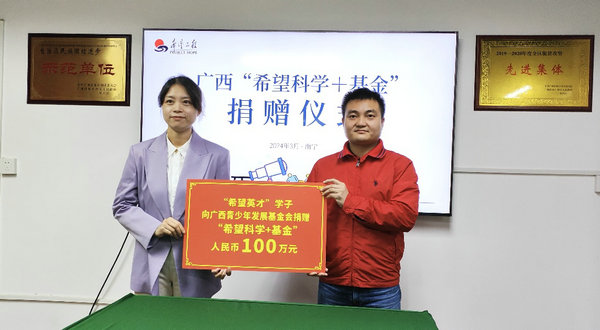

Although Chen Yuliang was not economically affluent, he decided to donate 1 million yuan ($138,237) to the Guangxi Youth Development Foundation to support impoverished young people in pursuing their scientific dreams.
This donation took place on March 13 in Nanning, South China's Guangxi Zhuang autonomous region. This 37-year-old philanthropist plans to contribute 100,000 yuan annually for 10 years.
Chen, currently the vice dean of the School of Civil and Architectural Engineering at Guangxi University of Science and Technology, was born into a rural family in Guigang city, Guangxi.
Eleven years ago, he completed his doctoral degree with the help of the Project Hope scholarship.
"Ever since I received the grant-in-aid, I've pledged to give it back in the future," Chen said.
Throughout his time as a student, Chen's father battled severe ankylosing spondylitis and couldn't work. The family relied on his mother's odd jobs to make ends meet until his mother also fell ill.
In 2010, Chen was accepted into a graduate program at Hunan University in Central China's Hunan province, but due to financial constraints, he transferred to Guangxi University, where he received a tuition waiver. "Even with the waiver, I barely had 100 yuan left after covering accommodation expenses," Chen recalled.
Moreover, with his younger brother also in university and requiring financial assistance, Chen took on the responsibility of supporting himself while pursuing his studies.
During his graduate studies, in addition to attending classes, Chen also worked part-time teaching positions at vocational colleges.
In 2013, with the highest academic performance in his field, Chen gained admission to pursue his doctoral studies at Guangxi University.
However, he faced a challenging financial situation that made him hesitate to continue his academic pursuits. He felt torn between earning money to treat his parents' illnesses and realizing his dreams.
Upon learning about his situation, the secretary of the university's Youth League Committee informed him that he could apply for a scholarship from the Guangxi Youth Development Foundation.
With his outstanding academic performance, impressive research skills, and his family's financial struggles, Chen passed the rigorous selection process and received a scholarship of 20,000 yuan.
"I told myself to work doubly hard and share my progress with Project Hope in the future," he said.
Su Yu, the secretary-general of the Guangxi Youth Development Foundation, was moved by Chen's diligence.
"Of all the people I know, he's the one who gets the least sleep. He often replies to my messages at 3 am and is already up by 6 am, starting his research for the day."
Just before the 2024 Chinese New Year, Chen and his wife decided to donate 100,000 yuan from his annual scientific research performance award to the Guangxi Youth Development Foundation.
After receiving the donation, the foundation suggested that Chen use the funds to improve the scientific literacy of young people in Guangxi.
"I've noticed that scientific education has always been lacking in rural areas. In the future, the digital and cognitive gaps between rural and urban children will likely widen," Chen explained.
According to him, the funds will be allocated toward organizing scientific activities in impoverished regions, particularly for the "left-behind" children whose parents migrate to urban areas in search of employment opportunities.
Since his days as a graduate student at Guangxi University back in 2010, Chen has provided support to 38 economically disadvantaged students.
Liu Zhihua, one of the graduate students whom Chen had mentored, also came from a financially challenged family.
Chen noticed Liu eating instant noodles while her peers dined in the cafeteria. Liu told him that her younger brother was still in school, her mother was working in domestic service, and her family had recently lost its source of income due to her mother's sudden illness.
"After understanding my situation, Mr Chen told me that the research group had arranged for me to take minutes at meetings and handle other tasks, which would earn me 400 yuan per month. In addition, upon publishing papers, I would receive research rewards. Thanks to this support, I managed to make it through that difficult time," Liu said.
Chen's assistance didn't weigh on the students mentally. Instead, it provided them with dignified financial support through labor.
However, the donation placed financial strain on Chen. "I have a mortgage to pay at home, money is needed for my parents' medical treatment, and my wife is pursuing her doctorate," he said. "But the support from school leaders, my colleagues, students, and the understanding of my wife put me at ease as I fulfill my commitment to public welfare."
Chen hopes that by setting an example, he can inspire more businesses, organizations, and individuals to join public welfare initiatives, thereby pooling resources for the growth and success of young people.